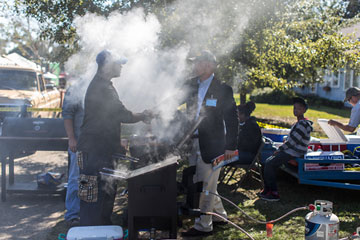
(2 of 4)
The ugliness has roots in regret. It wasn't long ago that the GOP's moneymen greeted the rise of the Tea Party with open hearts and wallets. As the small-government movement gathered steam, they spent millions on Tea Party candidates in both 2010 and 2012 and lavished funds on the backroom efforts that carved the districts from which grassroots activists could run and win. But the romance soured when a cadre of conservatives shuttered the government in a doomed bid to gut Barack Obama's health care law.
The chamber, which spent some $36 million in 2012, is expecting to invest in about 30 races this time, defending business-friendly Republicans like embattled Idaho Representative Mike Simpson as well as a trio of conservative House Democrats in red states: Jim Matheson of Utah, Mike McIntyre of North Carolina and John Barrow of Georgia. In addition, the chamber is expected to bankroll primary challenges against two Republican incumbents: Justin Amash, a Ron Paul disciple who tried in January to unseat John Boehner as Speaker, and Kerry Bentivolio, a former reindeer farmer who is being challenged by a member of the board of trustees of the Michigan chamber.
This early involvement in GOP primaries is something strange and new for business lobbies. Trade associations and corporate political action committees (PACs) have long been leery of sinking their political and financial capital into intramural spats. But the shutdown put an estimated $24 billion dent in the U.S. economy and punctuated Big Business's frustration. "We're seeing a desire to play a bigger role earlier in the process," says former Michigan governor John Engler, who now heads the Business Roundtable.
The race in lower Alabama is the shape of things to come. The more moderate Byrne has outraised the upstart Young by a ratio of about 8 to 1. The PACs of Walmart, AT&T, Comcast and General Electric have all sent checks to Byrne. Beltway trade associations, including the National Association of Realtors and the American Bankers Association, have also ponied up. Both groups had forked over some $2 million to the Republicans who forced the shutdown and voted against the deal to reopen the government, according to the Center for Responsive Politics. And they aren't the only groups that may be poised to alter their spending patterns. "We need to get into primaries to defend probusiness incumbents who are under attack because they are only 90% pure," explains Dirk Van Dongen, president of the National Association of Wholesaler-Distributors, whose PAC sent Byrne $5,000.
It's not hard to figure out who House Republicans are rooting for. Nineteen incumbents pumped $66,000 into Byrne's war chest from Sept. 5 to Oct. 16, according to an analysis by TIME--more than Young's total haul over the same period. Among those backers were House majority leader Eric Cantor; committee chairmen Darrell Issa, Pete Sessions and Dave Camp; and several members of the Alabama delegation.
